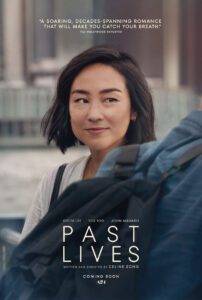
Director: Celine Song
Release Year: 2023
Runtime: 1h 45min
I thought this shit had time travel. Or ghosts. I mean we have a film called Past Lives, and we don’t have anything mysterious, sci-fi or otherwise supernatural? My movie-watching brain is broken. A modern film with no CGI, no gunfights or superheroes and essentially no violence. A story about relationship and nothing more. It seems almost impossible and, frankly, just a little bit weird. Honestly, I kept waiting for some magic to seep in. For our main character, Nora (Greta Lee), to somehow inhabit her childhood body with an adult consciousness. Or be transported back in time with all the knowledge of her future in tact. But, no, it’s just a story about this woman and the duality of her life growing up in Korea until age twelve and then being transplanted to Canada and eventually the United States. And how you never really leave the formative moments and people of your past life behind emotionally, despite moving on physically into this new world.
This will be an unpopular opinion, but I found this film to be kind of boring. Which I know is not a constructive way to describe a movie, but it is what it is. I get the “beauty” in the intimate moments. I understand the feeling of otherness can be lonely and stigmatizing and that reconnecting with your past can anchor you to a place and a feeling that may not be achievable in your new life. A deeper feeling of belonging than is possible otherwise. But perhaps – and this is just me talking — we didn’t need 106 minutes to examine this in what felt like foggy slow motion. With the same constant music cue that made me want to stab out my anvils. It just kind of sat there for me. I got the point and then it just kept going, putting the onus on the eyes of characters looking at one another sadly. Or longingly. Or awkwardly. Pleading, but also not. And then it ends.
Here’s the scoop. Nora is friends with this kid, Hae Sung (Teo Yoo) in Korea. They are schoolmates. And playmates. Because what else are you going to be when you’re twelve? One day Nora’s family up and moves to Canada for her dad’s job and Nora has to leave Hae Sung behind. Sure, she’s sad, but the end of that relationship is not specifically catastrophic or anything. We see snippets of her at school in her new homeland, and of course she’s an outsider due to the language barrier and otherwise being a non-white foreigner, which makes her different. Check. We see Hae Sung back in Korea, doing his time in the army and hanging with his buddies. Normal stuff. Things progress, she ends up in New York City and reconnects with Hae Sung through Facebook. Modern times, am I right? They carry on what would, in the old days, be a pen-pal situation, which could theoretically be more? But circumstance prevails, she cuts off contact to some extent, they drift apart, she gets married and a decade and a bit pass before they ever speak again. He comes to visit, things get complicated (but not overly so) because she’s married, of course, but it’s all very twee and nice. The end.
Here’s the rub. Would there be any tension both with Nora, her husband, Arthur (John Magaro) and Hae Sung if Hae Sung didn’t grow up to be really good looking? Would it have made for a more interesting film if Nora reconnected the first time with adult Hae Sung and he was just some average-looking schlub and not a square-jawed, perfectly coiffed model-type? Or maybe he looks like this the first time they reconnect, and then the second time twelve years later he’s like maimed in some South Korean industrial accident? In other words, is this man representing her past, and that is her attraction to him, or is she just thirsty for this boy she once liked who has turned into a handsome prince? Especially — and no shade to Magaro here — when she basically married her nebbish of a husband to score a green card (remembering, she’s Canadian and not American). Even her husband asks that question pretty directly and gets a pretty wishy-washy answer. I just think the casting adds a level of ambiguity about Nora’s motivations to the situation that I don’t think writer/director, Celine Song, intended.
Look, I’m not completely convinced my brain is irredeemable when it comes to watching movies. I just think I need to be eased in. I can’t go cold turkey on the time travel or magical realism thing. This is most likely why I dared utter the b-word above. I just kept expecting something, anything to break up the languid pacing, the walks around downtown Manhattan or Brooklyn or wherever those ferries leave from. I hoped for someone to put a stop to the honking score and give me a real needle drop! But, no, it kind of crept along, holding my interest. But tenuously. That’s not to say there weren’t some nice scenes. Even memorable ones. But taken as a whole, it just didn’t hit the way — or in the right place in my chest — that it could have with a little more focus on the relationships and less on the filmmaking. Which felt, at times, a bit forced. Like she watched a bunch of Woody Allen movies back-to-back and tried the whole strolling-through-the-city-while-chatting-from-a-distance thing, but didn’t quite nail it. Sure, it had a little humor, but not wry humor. To the point you could feel the mechanics bleeding through in places. Or the hero worship. It’s all very pleasant. But, for me, pleasant just doesn’t cut it in the heightened year of our lord 2024 (when all of our brains will inevitably be challenged by anger, fright, rage and the underlying smell of political violence).


